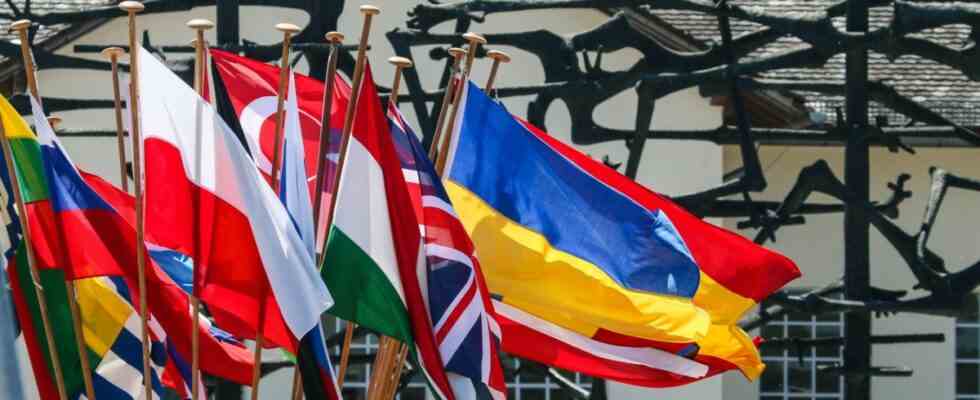They come to Dachau from Austria, Italy, France, Israel and the Ukraine – five survivors take part in the commemoration of the 77th anniversary of the liberation of the Dachau concentration camp. After a two-year break in the Corona pandemic, the events can finally take place again in attendance. However, the joy is dampened: Since the start of the Russian war of aggression against Ukraine on February 24, there have been fears in Dachau for the concentration camp survivors in Ukraine. They are very old, and some are too ill to flee to the West to escape the hail of bombs. 96-year-old Holocaust survivor Boris Romanchenko, a former Buchenwald prisoner, was killed in a Russian bombing raid on Kharkiv. That was the final impetus for an unusual step by the concentration camp memorials in Germany: Russian and Belarusian diplomats and consuls were disinvited in protest against Putin’s war. Consular representatives of Ukraine, on the other hand, will take part in the commemoration ceremony in Dachau on May 1st.
However, the commemoration of the Nazi victims from Belarus and Russia should not suffer. The concentration camp memorial donates wreaths and will lay them in front of the international memorial. The usual wreath ribbons in the national colors of the two countries will be dispensed with. The ribbons bear the inscription: “In memory of the Russian victims of the Dachau concentration camp” and “In memory of the Belarusian victims of the Dachau concentration camp.” The national flags of Belarus and Russia will not be flown this time. The director of the Dachau memorial, Gabriele Hammermann, as well as the Dachau camp community and the Comité International de Dachau (CID) publicly condemned the Russian war of aggression three weeks ago.
The historian Boris Zabarko comes to Dachau
Hammermann is looking forward to a special guest under the current circumstances: the 86-year-old Holocaust survivor and historian Boris Zabarko managed to escape from Kyiv with his granddaughter. The President of the All-Ukrainian Association of Jewish Concentration Camp and Ghetto Survivors comes to Dachau. The Theresienstadt survivor Ernst Grube, 89, chairman of the Dachau camp community, speaks at the commemoration ceremony at the former “SS shooting range Hebertshausen” on Sunday, May 1. At this location, after the German Wehrmacht attacked the Soviet Union on June 22, 1941, more than 4,000 Red Army prisoners of war were shot by the camp SS. CID Vice President Abba Naor, 94, gives a speech on Sunday at the former crematorium, as does the mayor of Dachau, Florian Hartmann (SPD); the event takes place in a closed circle. The day before, Naor speaks at the Death March Memorial. Naor is a survivor of the death march on which thousands of prisoners were driven by US Army units in the last few days before liberation on April 29, 1945. On March 22, 1933, the Nazi regime opened one of the first concentration camps in Dachau, which served as a model for all concentration camps and extermination camps. More than 200,000 people from over 40 nations were imprisoned in Dachau and its satellite camps, at least 41,500 prisoners were murdered or died of hunger, disease, torture and the consequences of concentration camp imprisonment even after their liberation.
The 77th anniversary events begin on Thursday, April 28, with a concert of works by Jewish and persecuted composers, including Paul Ben-Haim, Emil František Burian and Ernest Bloch, at Dachau Palace (admission at 6:30 p.m.). The selected pieces have a direct connection to Munich or the history of the Dachau concentration camp. The memorial and the Ben Haim Research Center of the University of Music and Performing Arts Munich (HMTM) are organizing the memorial concert. The exhibition “Dachau Trials – Crimes, Procedures and Responsibility” will open on Friday. It is closely linked to the biography of Alfred Edward Laurence, who was a prisoner in the Dachau concentration camp between February and October 1937. Seven years later he returned as a US Army soldier and was involved in the liberation of the Dachau camp in April 1945. He then worked as an investigator for the War Crime Investigation Team 6826. On April 29, his daughter Virginia Laurence and his granddaughter Annemarie Wadlow will talk to Christoph Thonfeld, head of the scientific department, about the life and work of her father in the visitor center of the Dachau concentration camp memorial site and grandfather speak. It is particularly about dealing with Nazi persecution, concentration camp imprisonment and their criminal law processing as a family legacy from the perspective of different generations.
This time there is only a silent commemoration with a wreath-laying ceremony at the Jewish memorial. At the central commemoration ceremony at the former roll call area, Hammermann, head of the memorial, will give a greeting, followed by a speech by the foundation director and state vice president Karl Freller (CSU). Then Minister of Education Michael Piazolo (Free Voters) and CID President General Jean-Michel Thomas speak. At 1 p.m. there will be a commemoration at the former “SS shooting range Hebertshausen”. After the liberation ceremony, the Association for the Promotion of International Youth Meetings invites you to the Day of Meetings at 12.45 p.m. in the Max-Mannheimer-Haus, Roßwachtstraße 15. Managing Director Andrea Heller comes up with redeeming news in advance: “We are very happy – Vera, the daughter of the deceased Dachau survivor Volodymyr Dshelali, and her husband managed to escape from Mariupol! The family is still separated – Dshelali’s grandson is still in another city. But thanks to my colleague’s mediation, Vera and her husband now have an address where they can find shelter and find peace for a few days.”

